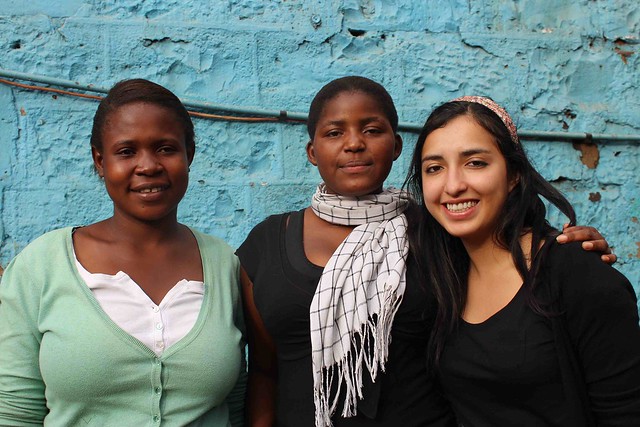
Andrea Arzaba with Yvonne Tiany in Mathare
As mentioned in a previous post, we were privileged to have guests from Global Voices visiting the Kibera and Mathare programs on July 1. The intention wasn’t only to share Map Kibera with them, but to work together on some interesting local stories for Rising Voices and our own media sites.
Rising Voices is a great initiative by Global Voices to “extend the benefits and reach of citizen media by connecting online media activists around the world and supporting their best ideas.” The authors of the posts below are part of this project and come from all corners of the globe, where they blog about important local issues. For many of them, the opportunity to travel to the Global Voices Summit is a rare chance to see this part of the world and learn about how Kenyans are practicing citizen journalism like themselves.
Five fantastic posts have so far been written by our visitors, who explored topics in Mathare and Kibera that were of interest to them. One great summary post written by the director of Rising Voices, Eddie Avila, sums up the experience.
- Putting Marginalized Communities on the Map by Leila Nachawati Rego, who is from Spain and Syria, describes Map Kibera’s work in the Kibera community in light of the post-election violence of 2007/8.
- Kenya Needs Political Leaders Not Dealers by Kevin Rennie, shares about a visit to Mchanganyiko hall to learn about their rights and elections work.
- Mathare Youth Blogging for Change in Their Community, was jointly written, researched and photographed by Ylenia Gostoli, Saffah Faroog and Yvonne Tiany (of Map Mathare).
- Kibera Power Women Challenging HIV Stigma, by Ahmed Awadalla of Egypt and Rayna St. of Bulgaria, describes the Map Kibera office visit and a visit to Power Women.
- Mapping Kibera a Visit to Nairobi’s Slums discusses education in Kibera and was written by Salman Latif (Pakistan) in collaboration with Rezwan (Bangladesh) and Juan Arellano (Peru).
Here are some great Flickr photo sets from our visitors, too:
Kibera photos by Laura Schneider.
Mathare photos by Andrea Arzaba.